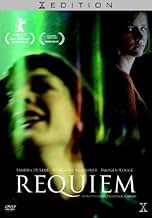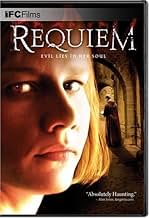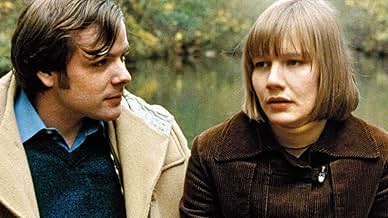CALIFICACIÓN DE IMDb
6.8/10
6.6 k
TU CALIFICACIÓN
Agrega una trama en tu idiomaA young woman with epilepsy suffers a breakdown during her first year at university, then decides to seek help from a priest in battling the troubles associated with her strict upbringing.A young woman with epilepsy suffers a breakdown during her first year at university, then decides to seek help from a priest in battling the troubles associated with her strict upbringing.A young woman with epilepsy suffers a breakdown during her first year at university, then decides to seek help from a priest in battling the troubles associated with her strict upbringing.
- Premios
- 16 premios ganados y 19 nominaciones en total
- Dirección
- Guionista
- Todo el elenco y el equipo
- Producción, taquilla y más en IMDbPro
Opiniones destacadas
Requiem (2006)
When a positive, well-meaning, troubled young woman meets an ungodly end at the hands of religious zealots, it matters that it is based on fact. So when you see what is going on here to this girl, leaving for college and struggling with some kind of mental disorder, you not only feel for the character. You are astonished about a culture that still has room for this.
The portrayal of mental illness has transformed enormously in the history of movies partly because psychology has changed, too, from Freud and Jung to now. Even looking at the last few minutes of "Psycho" (which everyone conveniently forgets), you see that arch confidence and inaccuracy of mid-century psychology. And now, in 2011, we know how to treat epilepsy (the purported disorder of the main character) and even schizophrenia (likely an additional problem judging by the symptoms) with some level of control.
But this movie is set between the two, around 1971, and so with hindsight we are shocked and frustrated by the people around our main character showing either a "get over it" attitude of a more deadly "god will intervene" kind of attitude. Neither was a good thing.
And yet this woman, played with unusual conviction and brilliant by Sandra Huller, is all about trying to survive. Because of her upbringing she interprets some events as God rejecting her (she can't reach her rosary beads during one epileptic fit), and of course this leads to priests, and to the priests thinking they know how to possibly cure the poor girl. Eventually real life exorcisms are performed, and in a weird synchronicity, a real-world version of the 1973 American film, "The Exorcist."
This one is German, and instead of making everything strange, it makes everything universal. We sometimes think of religious extremism as an American trait, but in fact it is everywhere. This version gives it a Roman Catholic overtone and yet grounds in the the real world, where priests are rather ordinary folk. not mythic brooding types (though the younger priest here is, vaguely, a German Damien). The original "The Exorcist" it turns out was based on a German Lutheran (not Catholic) boy, yet another small echo of one movie to the other.
The comparisons can go too far, for sure. This is a modern movie in what is one thread of contemporary European filmmaking--understated, realist, tautly filmed, issue based movies, many of them from Denmark or Germany. It's a great complement to what is being made here (in the U.S.), with a different flair for dialog and sometimes a more elaborate production sense. This is not small budget but it is straight ahead and almost bare bones in its approach, thoughtfully made and edited. And pertinent now in the sense that fanaticism in any form is to be questioned before it's too late.
When a positive, well-meaning, troubled young woman meets an ungodly end at the hands of religious zealots, it matters that it is based on fact. So when you see what is going on here to this girl, leaving for college and struggling with some kind of mental disorder, you not only feel for the character. You are astonished about a culture that still has room for this.
The portrayal of mental illness has transformed enormously in the history of movies partly because psychology has changed, too, from Freud and Jung to now. Even looking at the last few minutes of "Psycho" (which everyone conveniently forgets), you see that arch confidence and inaccuracy of mid-century psychology. And now, in 2011, we know how to treat epilepsy (the purported disorder of the main character) and even schizophrenia (likely an additional problem judging by the symptoms) with some level of control.
But this movie is set between the two, around 1971, and so with hindsight we are shocked and frustrated by the people around our main character showing either a "get over it" attitude of a more deadly "god will intervene" kind of attitude. Neither was a good thing.
And yet this woman, played with unusual conviction and brilliant by Sandra Huller, is all about trying to survive. Because of her upbringing she interprets some events as God rejecting her (she can't reach her rosary beads during one epileptic fit), and of course this leads to priests, and to the priests thinking they know how to possibly cure the poor girl. Eventually real life exorcisms are performed, and in a weird synchronicity, a real-world version of the 1973 American film, "The Exorcist."
This one is German, and instead of making everything strange, it makes everything universal. We sometimes think of religious extremism as an American trait, but in fact it is everywhere. This version gives it a Roman Catholic overtone and yet grounds in the the real world, where priests are rather ordinary folk. not mythic brooding types (though the younger priest here is, vaguely, a German Damien). The original "The Exorcist" it turns out was based on a German Lutheran (not Catholic) boy, yet another small echo of one movie to the other.
The comparisons can go too far, for sure. This is a modern movie in what is one thread of contemporary European filmmaking--understated, realist, tautly filmed, issue based movies, many of them from Denmark or Germany. It's a great complement to what is being made here (in the U.S.), with a different flair for dialog and sometimes a more elaborate production sense. This is not small budget but it is straight ahead and almost bare bones in its approach, thoughtfully made and edited. And pertinent now in the sense that fanaticism in any form is to be questioned before it's too late.
I've seen both The Exorcism of Emily Rose and this one and found Requiem to be far better and realistic than the other. Emily Rose, in my opinion, was supposed to be commercial Hollywood film. It lulled me to sleep whereas Requiem kept me interested during its entirety. The chief reason for this being the phenomenal performance by the lead actress.
The direction of the film is great as well, since it clearly allows the viewers to form their own decision whether the girl is possessed or schizophrenic. Viewers make their decisions based on which side of the faith they lie. It runs a bit slow but is an excellent psycho-drama devoid of any gratuitous scary scenes.
So overall, in case you like scary stuff, watch Emily Rose; which is not such a great scary movie either. However, if you like psychological dramas and do not wish to watch movies that make you jump out of your seat, watch this one.
The direction of the film is great as well, since it clearly allows the viewers to form their own decision whether the girl is possessed or schizophrenic. Viewers make their decisions based on which side of the faith they lie. It runs a bit slow but is an excellent psycho-drama devoid of any gratuitous scary scenes.
So overall, in case you like scary stuff, watch Emily Rose; which is not such a great scary movie either. However, if you like psychological dramas and do not wish to watch movies that make you jump out of your seat, watch this one.
To be frank I completely disagree with the above critique. I found this film quite moving and very sad - I still can't stop thinking about.
I thought the way it was shot moved it along fairly nicely and was thankfully fairly anti- Hollywood which was a nice relief. Of course most Americans will probably not enjoy it because it's too subtle, nothing explodes and they actually have to think for a change rather than being told how to feel. If Hollywood had done this film it would have been all moody lighting, scary music and SFX - it would have been just another badly done version of The Exorcist (which I think is also a great film).
I think what I found the most interesting was that because this film was done in such an understated manner, you could actually understand what Michaella was going through in a much more realistic, believable manner.
There is a beautiful scene where near the end of the film Michaella's boyfriend takes her to her parents house because she is in such a bad state. She is soon surrounded by her parents and two priest all praying and chanting at her trying to exorcise her demons - her boyfriend steps away as he really doesn't know where to put himself or what to do as he watches the chanting - he looks like he is witnessing the dark ages of superstition; all completely anachronistic to the time he lives in.
Documentary style was a great choice - there were no true good or bad guys. And Michaella truly believed that she was possessed. So in a really strange way it was more an analysis of faith and belief. At the end of the day she, her family and the creepy priest all absolutely believed that she was possessed therefore she was.
Was that a good or bad thing, considering that nowadays most people barely believe anything at all?
Maybe she did fight an epic battle against demons for our souls like Saint Margarita - can anyone prove otherwise?
I thought the way it was shot moved it along fairly nicely and was thankfully fairly anti- Hollywood which was a nice relief. Of course most Americans will probably not enjoy it because it's too subtle, nothing explodes and they actually have to think for a change rather than being told how to feel. If Hollywood had done this film it would have been all moody lighting, scary music and SFX - it would have been just another badly done version of The Exorcist (which I think is also a great film).
I think what I found the most interesting was that because this film was done in such an understated manner, you could actually understand what Michaella was going through in a much more realistic, believable manner.
There is a beautiful scene where near the end of the film Michaella's boyfriend takes her to her parents house because she is in such a bad state. She is soon surrounded by her parents and two priest all praying and chanting at her trying to exorcise her demons - her boyfriend steps away as he really doesn't know where to put himself or what to do as he watches the chanting - he looks like he is witnessing the dark ages of superstition; all completely anachronistic to the time he lives in.
Documentary style was a great choice - there were no true good or bad guys. And Michaella truly believed that she was possessed. So in a really strange way it was more an analysis of faith and belief. At the end of the day she, her family and the creepy priest all absolutely believed that she was possessed therefore she was.
Was that a good or bad thing, considering that nowadays most people barely believe anything at all?
Maybe she did fight an epic battle against demons for our souls like Saint Margarita - can anyone prove otherwise?
A sad tale of a young girl's aspirations disastrously ruined by her and her family's inability to separate her religion from her mental illness.
The script is commendably non-judgemental, despite the subject matter, and the the movie's early seventies setting is re-created so convincingly (with muted colours and almost dogme-like camera work) that one might forget that the film was shot only three years ago.
Some may find that the film ends before the story does, but this is merely a refreshing refusal to pander to sensationalism that is completely in keeping with the naturalistic realism of the film as a whole.
The script is commendably non-judgemental, despite the subject matter, and the the movie's early seventies setting is re-created so convincingly (with muted colours and almost dogme-like camera work) that one might forget that the film was shot only three years ago.
Some may find that the film ends before the story does, but this is merely a refreshing refusal to pander to sensationalism that is completely in keeping with the naturalistic realism of the film as a whole.
Phew this is hard to put into words.
At first I thought the cinematography was stunning, beautifully shot and the period was captured perfectly - I felt like I was watching a film shot in 1972 and it brought back early memories of the 70s.
The script was wonderfully subtle, there was absolutely no judgements about the characters. It would have been very easy to show the mother as a cruel an twisted woman but instead you could empathise with her, she thought she was doing the best for her daughter and that made the whole thing more tragic but also more real and beautiful.
To me the central message of the film was that life, however short is something to celebrate. The girl makes references to St Katarina who only lived a short time but did many wonderful things. She may not have escaped her strict and cruel mother for long but at least she did it and had a wonderful time for a while.
I kept having to tell myself they were actors. The depiction of the girl's first kiss at college was unlike any other I've seen. They captured the clumsiness and true feeling of the situation perfectly.
And finally the soundtrack - you'd think that deep purple wrote 'Anthem' for this film. Earlier we see her dancing ecstatically to the track when she's finally free at college and then we later see the relevance when it's used to play out at the end of the film.
I'm not sure I'll ever see a better film that this and I recommend it to anyone who occasionally likes to be moved by a movie.
At first I thought the cinematography was stunning, beautifully shot and the period was captured perfectly - I felt like I was watching a film shot in 1972 and it brought back early memories of the 70s.
The script was wonderfully subtle, there was absolutely no judgements about the characters. It would have been very easy to show the mother as a cruel an twisted woman but instead you could empathise with her, she thought she was doing the best for her daughter and that made the whole thing more tragic but also more real and beautiful.
To me the central message of the film was that life, however short is something to celebrate. The girl makes references to St Katarina who only lived a short time but did many wonderful things. She may not have escaped her strict and cruel mother for long but at least she did it and had a wonderful time for a while.
I kept having to tell myself they were actors. The depiction of the girl's first kiss at college was unlike any other I've seen. They captured the clumsiness and true feeling of the situation perfectly.
And finally the soundtrack - you'd think that deep purple wrote 'Anthem' for this film. Earlier we see her dancing ecstatically to the track when she's finally free at college and then we later see the relevance when it's used to play out at the end of the film.
I'm not sure I'll ever see a better film that this and I recommend it to anyone who occasionally likes to be moved by a movie.
¿Sabías que…?
- TriviaSandra Hüller's feature film debut.
- ConexionesFeatured in The Making of 'Requiem' (2006)
- Bandas sonorasDown 'n' Out
Performed by Light of Darkness
Written by J. Latimer, B. Grant, M. Reoch and M. Bebert
Courtesy of MOP-Musikverlag Hans Sikorski KG
With kind permission of Second Battle Records
Selecciones populares
Inicia sesión para calificar y agrega a la lista de videos para obtener recomendaciones personalizadas
- How long is Requiem?Con tecnología de Alexa
Detalles
- Fecha de lanzamiento
- País de origen
- Sitio oficial
- Idioma
- También se conoce como
- Requiem
- Locaciones de filmación
- Productoras
- Ver más créditos de la compañía en IMDbPro
Taquilla
- Total en EE. UU. y Canadá
- USD 9,600
- Fin de semana de estreno en EE. UU. y Canadá
- USD 3,309
- 22 oct 2006
- Total a nivel mundial
- USD 262,460
- Tiempo de ejecución1 hora 33 minutos
- Color
- Mezcla de sonido
- Relación de aspecto
- 2.35 : 1
Contribuir a esta página
Sugiere una edición o agrega el contenido que falta

Principales brechas de datos
What is the Spanish language plot outline for La posesión (2006)?
Responda

























